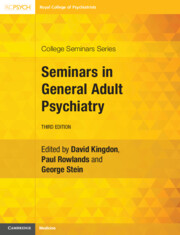Book contents
- Seminars in General Adult Psychiatry
- College Seminars Series
- Seminars in General Adult Psychiatry
- Copyright page
- Reviews
- Contents
- Contributors
- Introduction
- Chapter 1 Clinical Epidemiology
- Chapter 2 Assessment, Formulation and Diagnosis
- Chapter 3.1 Clinical Features of Depressive Disorders
- Chapter 3.2 Causes of Depression
- Chapter 3.3 Drug and Physical Treatments of Depression
- Chapter 3.4 Psychological and Social Treatment of Depression
- Chapter 4.1 Bipolar Disorder
- Chapter 4.2 Bipolar Disorder
- Chapter 5.1 Schizophrenia and Other Primary Psychoses
- Chapter 5.2 Causes and Outcome of Psychosis
- Chapter 5.3 Drug Treatment of the Psychoses
- Chapter 5.4 Psychosocial Management of Psychosis
- Chapter 6.1 Anxiety Disorders
- Chapter 6.2 Post-traumatic Stress Disorder
- Chapter 6.3 Specific Phobias
- Chapter 6.4 Obsessive-Compulsive and Related Disorders
- Chapter 6.5 Functional Neurological Disorder
- Chapter 6.6 Bodily Distress Disorder, Chronic Pain and Factitious Disorders
- Chapter 7.1 Clinical Features and Implications of New Classification of Personality Disorders
- Chapter 7.2 Clinical Approaches to Personality Disorder (AKA Complex Emotional Needs)
- Chapter 7.3 Antisocial and Other Personality Disorders, Impulse Control Disorders, and Non-substance Addictive Disorders
- Chapter 8 Neuropsychiatric Disorders
- Chapter 9 Autism
- Chapter 10 Attention-Deficit/Hyperactivity Disorder
- Chapter 11 Sleep Disorders and Psychiatry
- Chapter 12 Eating Disorders
- Chapter 13 Perinatal Psychiatry
- Chapter 14 Substance Use Disorders
- Chapter 15 Suicide and Self Harm
- Chapter 16 Physical Health Care
- Chapter 17 Culture, Mental Health and Mental Illnesses
- Chapter 18 Psychiatry in Primary Care
- Chapter 19 Psychiatry in the General Hospital
- Chapter 20 Adult Mental Health Services
- Index
- References
Chapter 13 - Perinatal Psychiatry
Published online by Cambridge University Press: 04 April 2024
- Seminars in General Adult Psychiatry
- College Seminars Series
- Seminars in General Adult Psychiatry
- Copyright page
- Reviews
- Contents
- Contributors
- Introduction
- Chapter 1 Clinical Epidemiology
- Chapter 2 Assessment, Formulation and Diagnosis
- Chapter 3.1 Clinical Features of Depressive Disorders
- Chapter 3.2 Causes of Depression
- Chapter 3.3 Drug and Physical Treatments of Depression
- Chapter 3.4 Psychological and Social Treatment of Depression
- Chapter 4.1 Bipolar Disorder
- Chapter 4.2 Bipolar Disorder
- Chapter 5.1 Schizophrenia and Other Primary Psychoses
- Chapter 5.2 Causes and Outcome of Psychosis
- Chapter 5.3 Drug Treatment of the Psychoses
- Chapter 5.4 Psychosocial Management of Psychosis
- Chapter 6.1 Anxiety Disorders
- Chapter 6.2 Post-traumatic Stress Disorder
- Chapter 6.3 Specific Phobias
- Chapter 6.4 Obsessive-Compulsive and Related Disorders
- Chapter 6.5 Functional Neurological Disorder
- Chapter 6.6 Bodily Distress Disorder, Chronic Pain and Factitious Disorders
- Chapter 7.1 Clinical Features and Implications of New Classification of Personality Disorders
- Chapter 7.2 Clinical Approaches to Personality Disorder (AKA Complex Emotional Needs)
- Chapter 7.3 Antisocial and Other Personality Disorders, Impulse Control Disorders, and Non-substance Addictive Disorders
- Chapter 8 Neuropsychiatric Disorders
- Chapter 9 Autism
- Chapter 10 Attention-Deficit/Hyperactivity Disorder
- Chapter 11 Sleep Disorders and Psychiatry
- Chapter 12 Eating Disorders
- Chapter 13 Perinatal Psychiatry
- Chapter 14 Substance Use Disorders
- Chapter 15 Suicide and Self Harm
- Chapter 16 Physical Health Care
- Chapter 17 Culture, Mental Health and Mental Illnesses
- Chapter 18 Psychiatry in Primary Care
- Chapter 19 Psychiatry in the General Hospital
- Chapter 20 Adult Mental Health Services
- Index
- References
Summary
In this chapter, we review how pregnancy and the postnatal period influence the manifestations of psychiatric disorder. Although rare, the postpartum psychoses can be devastating illnesses, occasionally associated with suicide and require timely treatments to bring them under control. Postnatal depression by contrast is a common and readily diagnosed disorder and responds well to standard treatments such as CBT and medication. However, it may have complex effects on mothering and the new-born in the early months following childbirth, and the present-day perinatal services that manage the bulk of these cases are reviewed here. Any psychiatric disorder can appear during pregnancy, and some conditions may worsen, but a few may paradoxically improve. The prescribing of medication to this population is a complicated task because of teratogenic risks – some known, others imagined – as well their safety in breast feeding, which is also reviewed. Effects on infants and children are important, so the chapter ends with a review of child abuse and neglect and its current diagnosis and management.
Keywords
- Type
- Chapter
- Information
- Seminars in General Adult Psychiatry , pp. 598 - 635Publisher: Cambridge University PressPrint publication year: 2024

